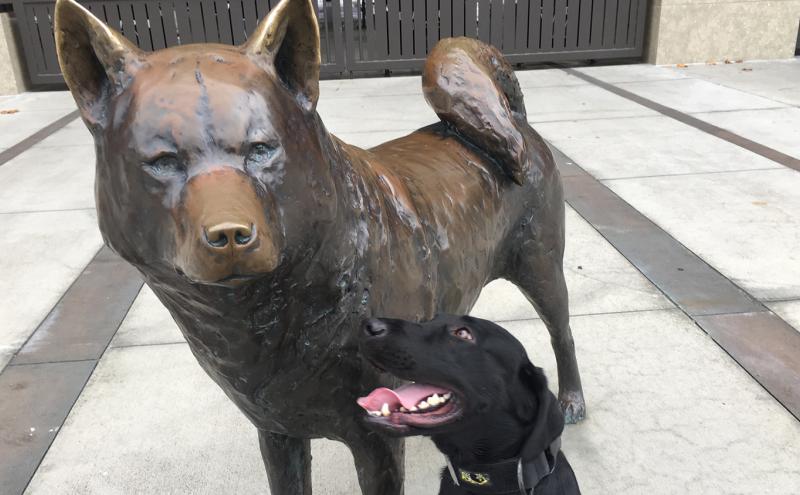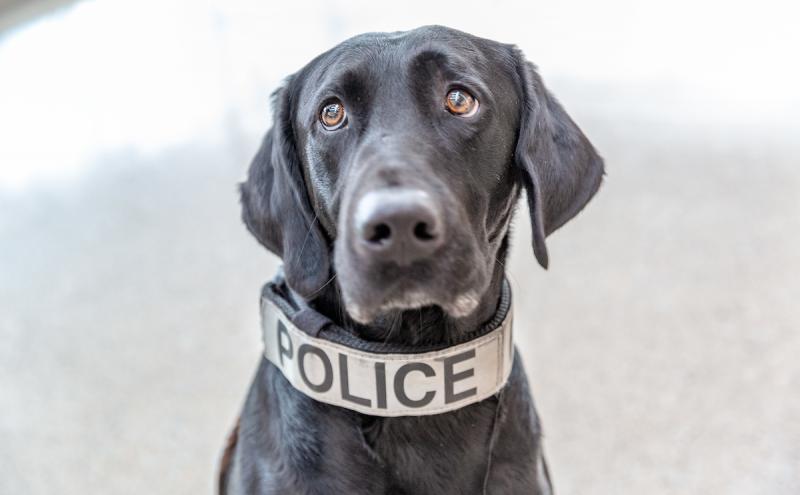
The Port of Seattle Police Department Explosive Detection Canine Unit has a new four-legged officer in training. Mando, short for Mandalorian, responds to praise and whistles, aims to please, and is learning how to sit.
The one-year-old German Shepherd is brand new to the Port and the working world — a first for the Port. Rather than going through the typical process of acquiring a dog already trained to detect explosives, POSPD decided to try something new. After recognizing Mando's potential for success, the department adopted him from the Auburn Valley Humane Society and he has begun the training process.
Mando joins a team of working canine professionals on the hunt for explosives at the airport and seaport who play a key role in keeping facilities, employees, and travelers safe. Their speed and flexibility in discovering the presence of explosives and their ability to follow suspicious odors give them a real edge over currently available mechanical detection devices in many circumstances.
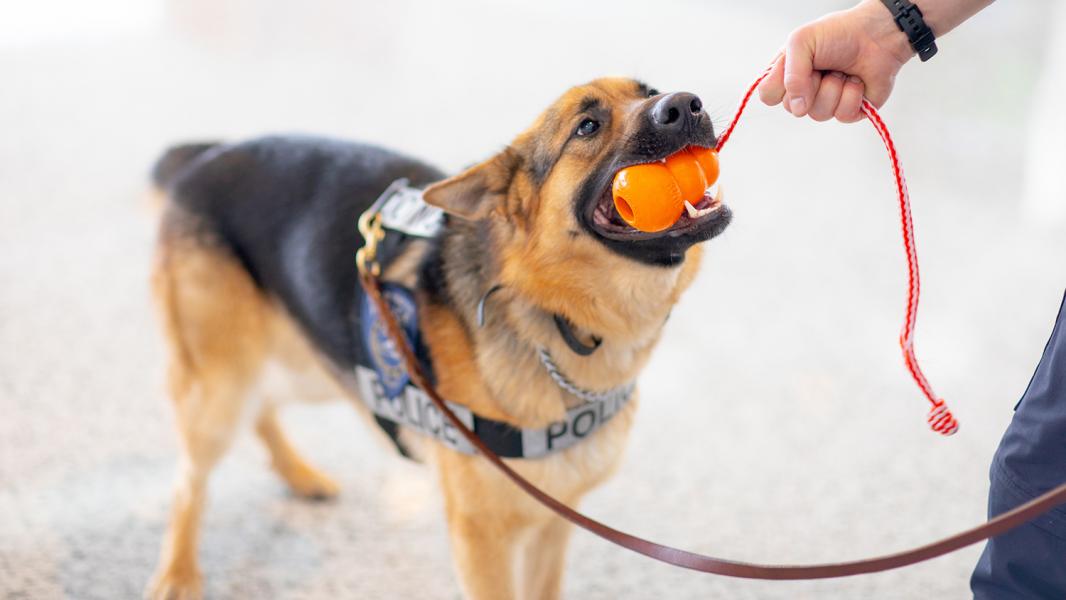
Starting fresh
Mando came to the Humane Society as a stray, without a microchip or any indication of where he had come from. Before bringing him on board the canine team, POSPD handlers did initial assessments to make sure he had the behavioral characteristics to be successful in the job.
“A couple of our handlers went down to the Humane Society on a lead,” said Sergeant Bryan Theckston, Mando’s handler and partner. “Mando was friendly and he went to find the ball when we hid it. We also walked him into Home Depot to see how he responded around people.”
What Mando lacks in experience, he makes up for in heart and perseverance. He is currently training with Theckston to learn the skills and experience necessary to be certified as a canine officer on the POSPD Explosive Detection Canine Unit.
The results of this pilot project with Mando will pave the way for how the department acquires and trains canines in the future. Theckston said the road ahead will be long and challenging.
“We’re starting from ground zero. We’ve never done this as a canine unit and we’re still in the testing phase,” he said. “Prior to Mando, all our dogs already came to us trained to find bombs and explosives. Right now, we’re trying to see if he can become a bomb dog. Eventually he’ll be introduced to all the training areas and explosives, and he’ll go through state certification with me.”
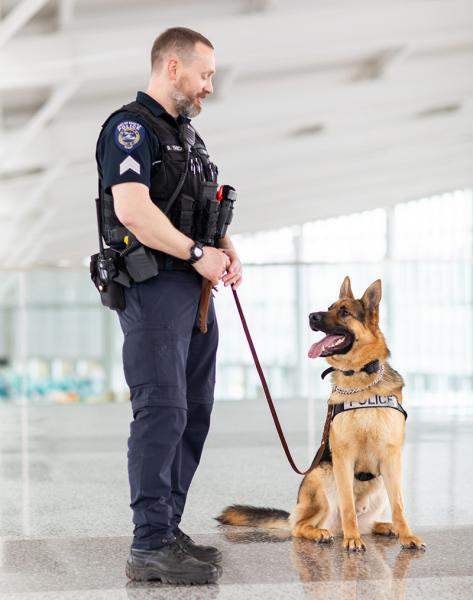
Learning the ropes
The training process for certification can take anywhere from six months to a year. During the strict annual certification process, canine teams are tested on their ability to detect explosives odors in various environments.
Theckston and Mando are currently training behind the scenes at the airport or offsite, away from the hustle and bustle of the terminals.
“There’s so much energy and activity in the terminal, it could set back training if we go there too soon,” he said.
Mando’s training currently consists of drills, starting with the basics, and Mando and Theckston have time to bond without interruptions. Learning to sit, being on leash, and chasing a ball for a reward, are among the first orders of business.
“He has a ton of energy and loves to run,” Theckston said. “We’ll go into an open field and let him run around to get him to calm down so he'll want to train.”
Theckston said training a new dog from scratch has both cost savings and team building benefits for the department. Acquiring a dog that has already completed necessary training can cost tens of thousands of dollars, but taking a chance on an inexperienced dog is also a risk.
“If we can do this successfully, it creates opportunity in the future,” Theckston said.
Creating a bond
When an officer is paired with a canine, they are taking on more than a new coworker or partner at work. The canine goes home with them at the end of the day and becomes part of their family.
“We go on long walks at night like we are on a date. We’re getting to know each other,” Theckston said.
Theckston has other dogs at home but interactions with Mando have been limited so far, until Mando undergoes more training.
“Dogs learn by watching the behavior of others,” Theckston said. “When they see good behavior in others, they pick up on our expectations for the dogs we have. Young pups take time to mature.”
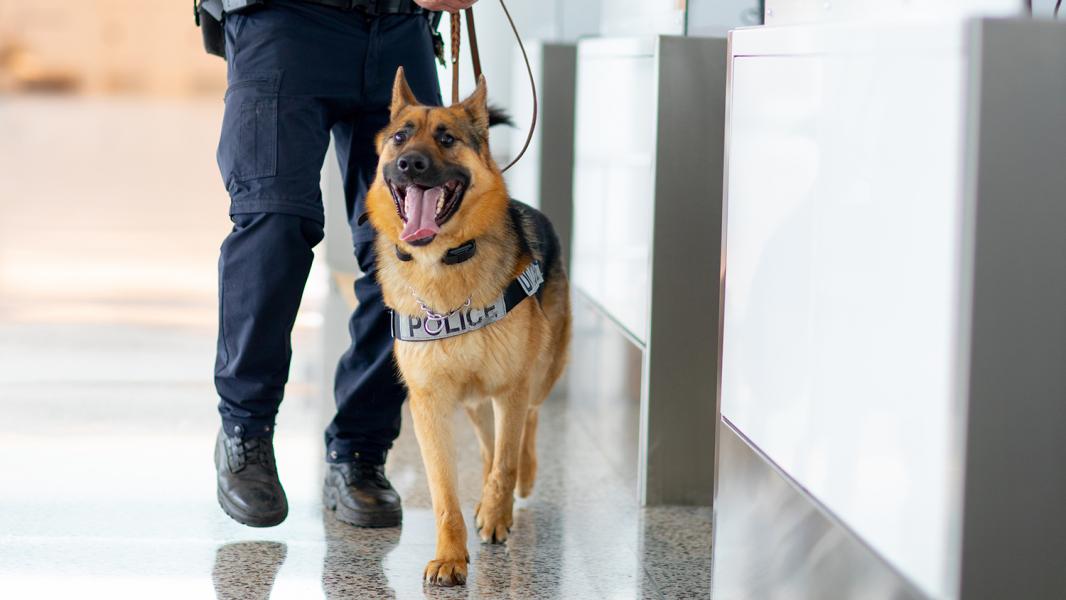
Part of the community
Mando may be new to the canine team, but he has already found a place in the community’s heart. POSPD recently invited the community to help choose a name for the new canine on its Facebook account. Of three options presented, Mando was the favorite.
The Port of Seattle Police Department encouraged public participation as part of a conscious effort to involve the community in the decision-making process.
“We’re trying to give the community a say in what goes on and bring awareness to the good work we are doing in our unit,” Theckston said.

